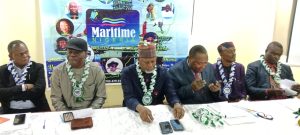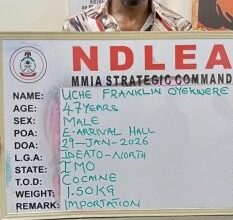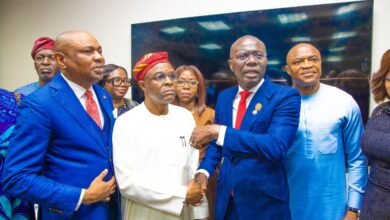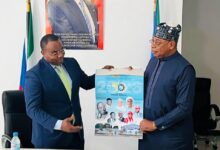
Barrister Hassan Bello, a former Executive Secretary/Chief Executive Officer of the Nigerian Shippers’ Council (NSC), has advised the federal government of Nigeria to stop building ports like constituency projects.
That ports should not be made to litter the country without a specific purpose.
Barr. Bello who gave the advice while speaking as a Special Guest at National Discourse 2 with Distinguished Maritime Personalities (DMPs) on Tuesday in Lagos.

He advised that ports should not be built for ports sake but for their viability and ability to compete with other global ports in terms of infrastructure and linkage to the multimodal transport mode.
“The consignment that the port attracts makes it what it should be. It should have integration. We should not just build ports because we have water.
“Our ports must be efficient and must be competitive. You decide and have choices and design.
Earlier, the former ES averred that competition is critical to the port development of any nation.
He maintained that for the ports to assume that expected standard, it must be smart, efficient and must not be an import dependent.
“Competition is critical to the development of ports but it looks like we don’t have it. Our ports must be smart, a no contact port, must be efficient.
“Our ports are built to keep receiving and any nation that does that alone will die.
“The question of shipping will be decided if we decide what we want to be. Is it ship building or ship repair..”
Speaking further, Barr. Bello called on the federal government to provide requisite infrastructure for an efficient port but admonished that it should be left to the private sector to run for a desired goal.
“The government has a bigger role to play in shipping business of the nation but it should be led by the private sector.”
He blamed the stunted growth in maritime and transportation sector on interference by individuals who towers their selfish interests above national interests.
As a result of that, many reforms are not fully achieved.
His words, “Ports and Harbour, Nigeria Transport Commission are parts of the port reforms. It is important that when reforms are on, there should not be pause. Reforms in the maritime industry are half done. You face a lot of personal interest above national interest.
In his welcome speech, convener of the Discourse, Kelvin Kagbare, rued establishment of universities and institutions in maritime and transportation, invest in overseas training of young Nigerians while neglecting capacity utilisation of the institutions already on ground but without ships or national line to absorb the cadets.
Kagbare fumed at leveraging on international maritime labour market, whereas the country contributes little or nothing to growing the market, saying it is a disservice that should be addressed by the federal government with urgency.
Kagbare, who is the publisher of Maritime Nigeria, stated that Nigeria’s shipping development capacity index was almost nil, giving foreigners absolute control over internal trade and transportation which according to him, is unacceptable and should be changed.
“With many state governments showing interests in the development of deep seàports including Ondo State, one hopes that there should be purposeful engagement in this direction towards achieving a quick break in reinventing our ports and maritime transport economy.
“With the prospects that the completion of these deep sea ports will raise Nigeria hub status and actualise the dream of providing the needed logistics for the West African corridor and it’s landlocked countries such as Mali, Chad and Niger Republic, is a big deal that should be given the serious and urgent attention it requires.
“Building deep seaports is perhaps the easiest of the tasks, those driving the ideas should also make the effort to make them function u optimally as viable ventures,aside also conferring some measure of regional political power on Nigeria,” he submitted.











